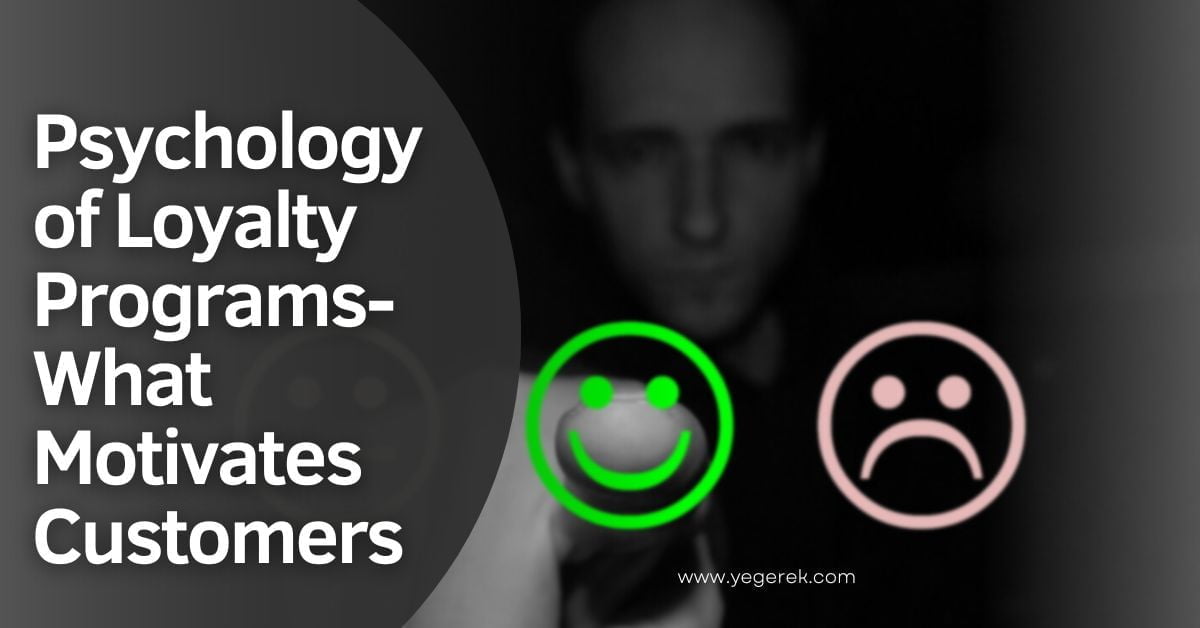
Understanding the Psychology of Loyalty: Motivating Customers to Participate
Customer loyalty is an essential aspect of every successful organization. Building a loyal client base might take years. Still, once you have one, it can help generate long-term development and profitability. Many companies have turned to loyalty programs to foster customer loyalty.
What drives customers to participate in these programs, and what motivates them to stay loyal? Understanding the psychology of consumer loyalty programmes may give helpful insights into how they function and how they might be improved.
Explanation of Customer Loyalty and Loyalty programs
Customer loyalty is the degree to which customers repeatedly choose to do business with a particular company or brand over time. It’s a crucial factor in a business’s success. It can drive repeat purchases, increase customer lifetime value, and generate positive word-of-mouth referrals.
Loyalty programmes are one technique that businesses strive to establish consumer loyalty. These programs offer rewards, incentives, and exclusive perks to customers who make repeat purchases or engage with the brand in other ways. Companies aim to incentivize customers to continue doing business with them by providing these benefits.
Importance of Understanding the Psychology of Loyalty
While loyalty programs can effectively build customer loyalty, they only work if designed to resonate with customers psychologically. That is why grasping the psychology of loyalty is vital. Businesses can create programs that truly resonate with customers and build lasting relationships by understanding the underlying factors that drive customer participation in loyalty programs and motivate them to stay loyal.
Additionally, by understanding the psychology of loyalty, businesses can identify potential barriers to adherence, such as negative experiences or lack of perceived value, and work to address them.
We’ll look at the power of reciprocity, the role of emotions, the impact of brand identity, the role of cognitive biases, the importance of trust, the Impact of customer experience, the part of rewards, and the effect of program structure on customer loyalty.
What is the Psychology Behind Customer Loyalty Programs?
Overview of the psychology Principles that Underpin customer loyalty Programs.
Customer loyalty programs leverage psychological principles to encourage repeat business and foster long-term customer loyalty. Some psychological principles underpinning these programs include reciprocity, social proof, scarcity, and the power of positive reinforcement. By understanding these principles, businesses can create loyalty programs that resonate with customers and encourage them to engage with the brand meaningfully.
How Loyalty Programs Use Psychology to Drive Engagement
Loyalty programs are designed to leverage psychological factors in a variety of ways. For example, they may offer rewards or incentives that tap into customers’ desire for positive reinforcement. They may also create a sense of exclusivity or social proof by providing benefits only available to program members. Using these tactics, loyalty programs can develop an understanding of attachment and loyalty to the brand.
Examples of How Different Loyalty Programs Use Psychological Principles to Drive Customer Loyalty
Many examples of loyalty programs use psychological principles to drive customer loyalty.
For instance, Sephora’s Beauty Insider program leverages customers’ desire for positive reinforcement by offering members free gifts, exclusive product launches, and birthday gifts.
Starbuck’s rewards program creates a sense of exclusivity by offering members access to exclusive events and custom drinks. By understanding the psychology principles that underpin customer loyalty programs, businesses can develop programs that resonate with their customers and build long-term loyalty.
Why Do Customers Participate in Loyalty Programs?
The role of rewards and incentives in motivating customers to join loyalty programs
One of the key reasons customers participate in loyalty programs is the promise of rewards and incentives. These can take many forms, from discounts and free products to exclusive access and personalized experiences. By offering these benefits, businesses can motivate customers to engage with the brand more meaningfully and create a sense of loyalty that goes beyond the transactional.
How Loyalty Programs Can Create Emotional Connections With Customers
Loyalty programs can also create emotional connections with customers by tapping into their desire for social connection, recognition, and belonging. To keep customers engaged, businesses can create a community of loyal customers with the same values and identity. This helps customers stay connected with the business.
Also, loyalty programs can create a sense of reciprocity by showing customers their loyalty is valued and rewarded.
Enhancing the customer experience can establish a powerful feedback loop that reinforces the emotional bond between the consumer and the organization. This can lead to increased loyalty, repeat business, and even referrals to friends and family. Investing in improving customer service is essential. This requires training your staff, upgrading your technology, and actively listening to feedback to implement necessary changes.
Your customers expect and deserve exceptional service, and failure to provide it could result in them taking their business elsewhere. As an entrepreneur, placing customer satisfaction at the forefront of your priorities is crucial.
What Motivates Loyal Customers?
Several psychological factors motivate customers to stay loyal to a brand or company, including a sense of identity, trust, and familiarity. Frequent customers tend to view themselves as members of the brand’s community and possess a feeling of personal investment in their association with the brand.
They also trust the brand to deliver on its promises consistently. They are familiar with the brand, making it easier to continue engaging with it.
Overview of How Loyalty Programs Can Reinforce These Motivational Factors
Loyalty programs can reinforce these motivational factors by providing opportunities for customers to express their identity and showcase their loyalty, such as through exclusive rewards and access to VIP experiences. They can also build trust by providing consistent and transparent rewards that align with the brand’s values.
Finally, loyalty programs can enhance familiarity by providing regular touchpoints with the brand and creating a sense of ongoing engagement. With using these motivators, businesses may enhance the link between the customer and the brand, resulting in a more loyal customer base.
Why Loyalty Programs are Effective in Building Customer Loyalty?
The Impact of Loyalty Programs on Customer Retention and Lifetime Value
Loyalty programs can have a significant impact on customer retention and lifetime value. Loyalty programs can encourage customers to continue engaging with a brand over time by incentivizing repeat purchases and creating a sense of exclusivity and reward. This can lead to increased customer lifetime value, as customers enrolled in a loyalty program tend to spend more than those not.
Also check out 10 Effective Ideas Build Successful Budget Loyalty Program
How Loyalty Programs Can Create Emotional Connections With Customers?
Loyalty programs can also create emotional connections with customers by providing a sense of belonging and recognition. By offering exclusive rewards and personalized experiences, loyalty programs can make customers feel valued and appreciated, leading to a more profound emotional attachment to the brand. Likewise, participating in a loyalty program can motivate a purpose of commitment and investment in the brand, resulting in a stronger emotional connection and more elevated levels of loyalty.
Overall, loyalty programmes can effectively establish long-term customer relationships and cultivate a loyal customer base.
Importance of Understanding Customer Psychology in Designing Effective Loyalty Programs
To create effective loyalty programs, it’s crucial to understand the underlying psychology that drives customer behavior. By understanding what motivates customers to participate in loyalty programs, you can design more engaging, rewarding, and effective programs for building customer loyalty.
- Personalization & Customization of Rewards & Experiences: Rewards tailored to the individual’s preferences & behavior increase engagement.
- Emotional Connections & Brand Affinity: Strong emotional relationships & positive associations with your brand increase loyalty.
- Sense of Exclusivity & VIP Treatment: Offering exclusive rewards & perks to loyal customers helps them feel valued & appreciated.
- Social Recognition & Status: Acknowledging and rewarding customers publicly for their loyalty can increase their rank & encourage them to continue.
- Ease of Use & Convenience: A simple, user-friendly loyalty program that’s easy to access and navigate will be more successful.
- Clear Communication & Transparency: Communicating program details, benefits, & reward redemption processes clearly and transparently increases trust.
The psychology of customer loyalty is vital in designing loyalty programs that drive engagement and retention. Emotional connections, personalization, exclusivity, and clear communication help organizations create programs that deeply connect with customers.
It’s time to leverage psychology to enhance loyalty programs and establish lasting customer loyalty. Contact



